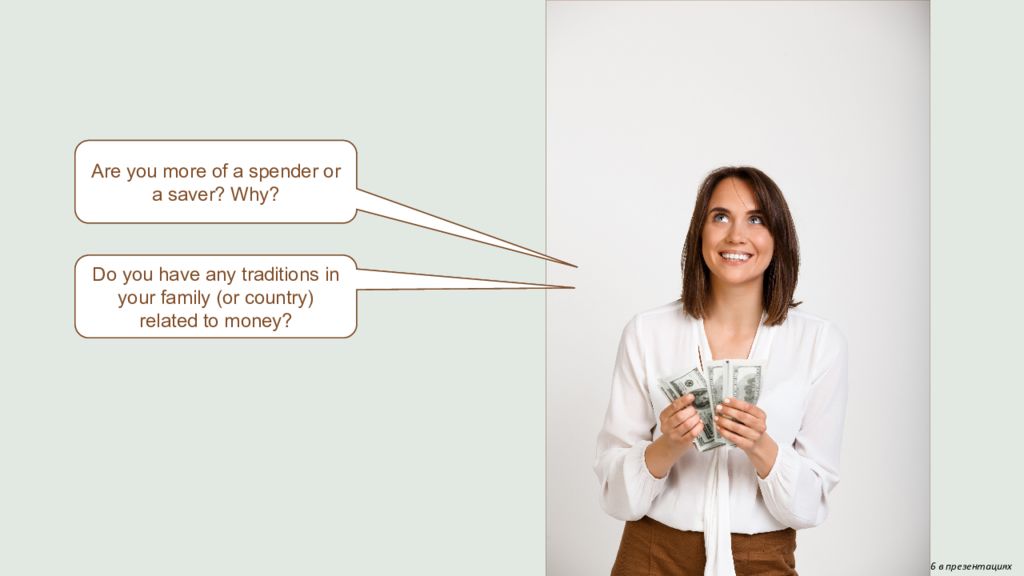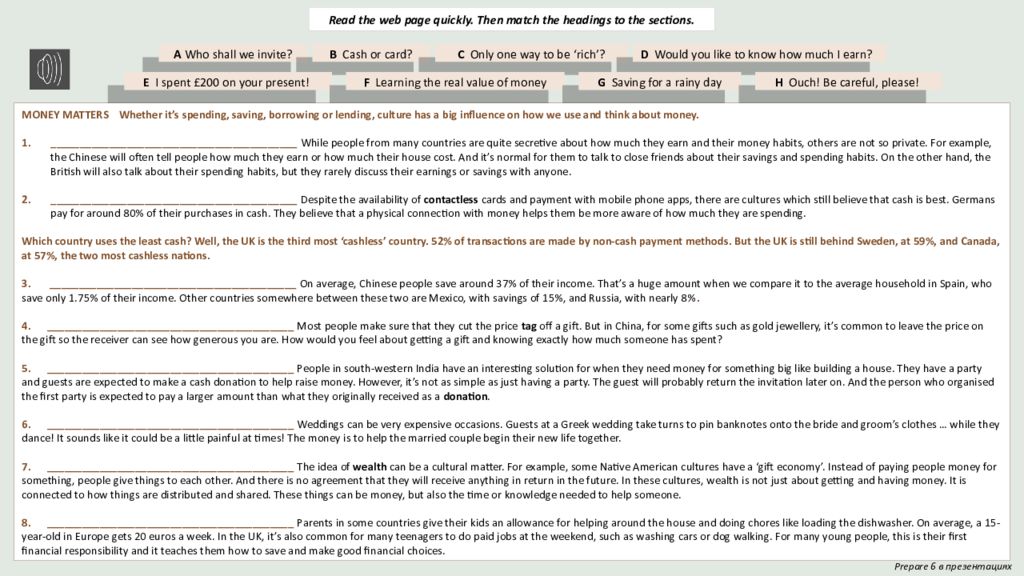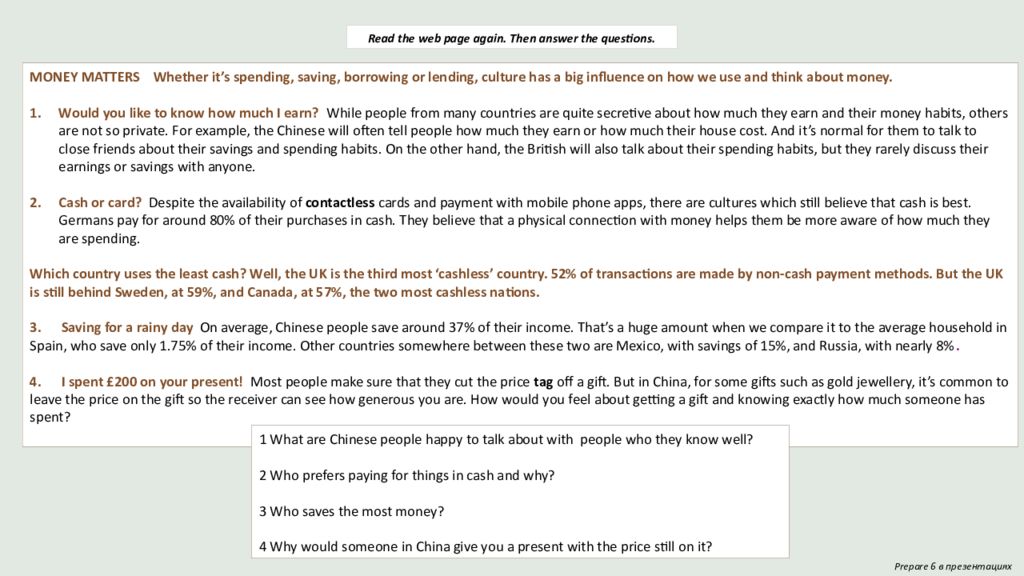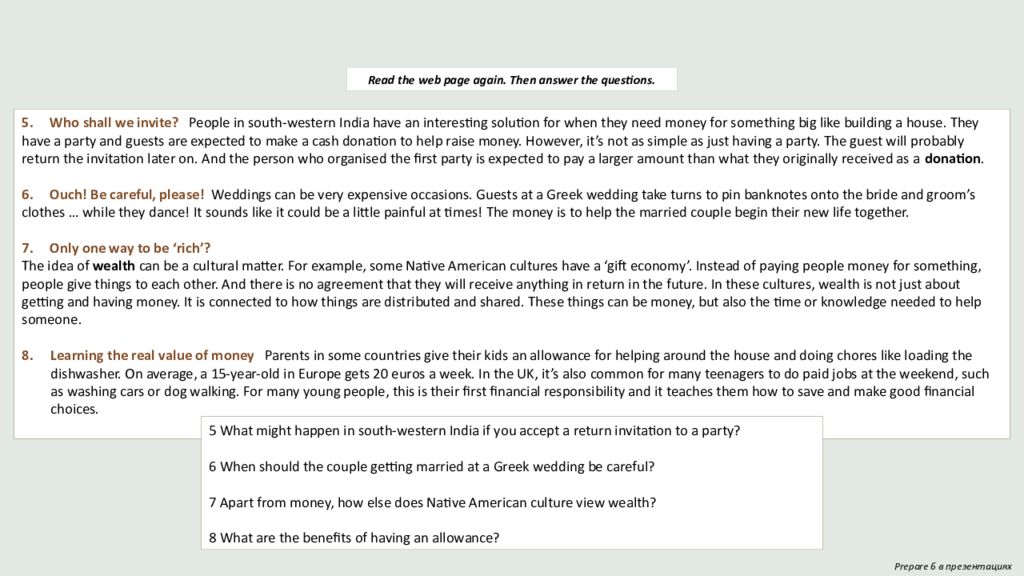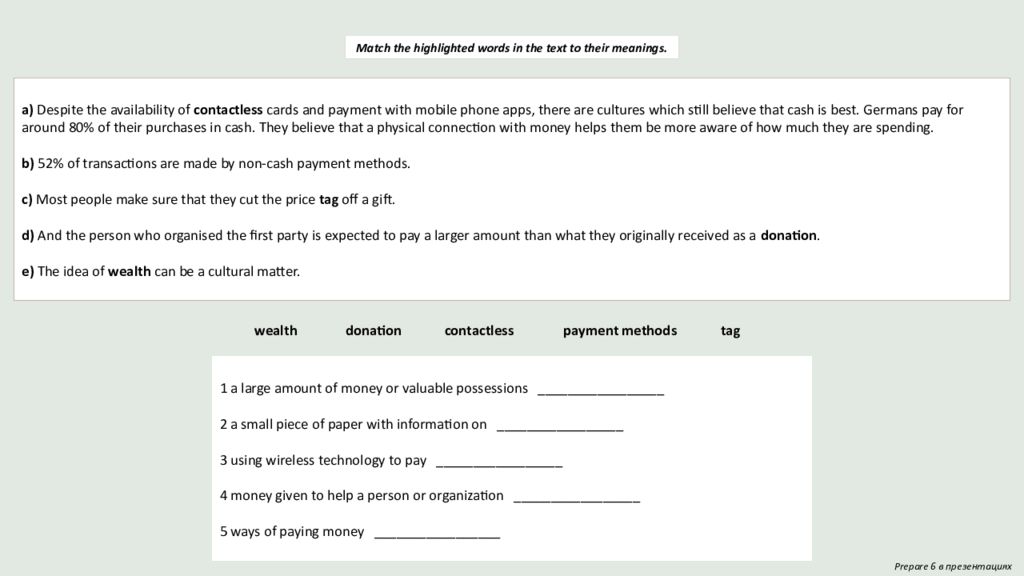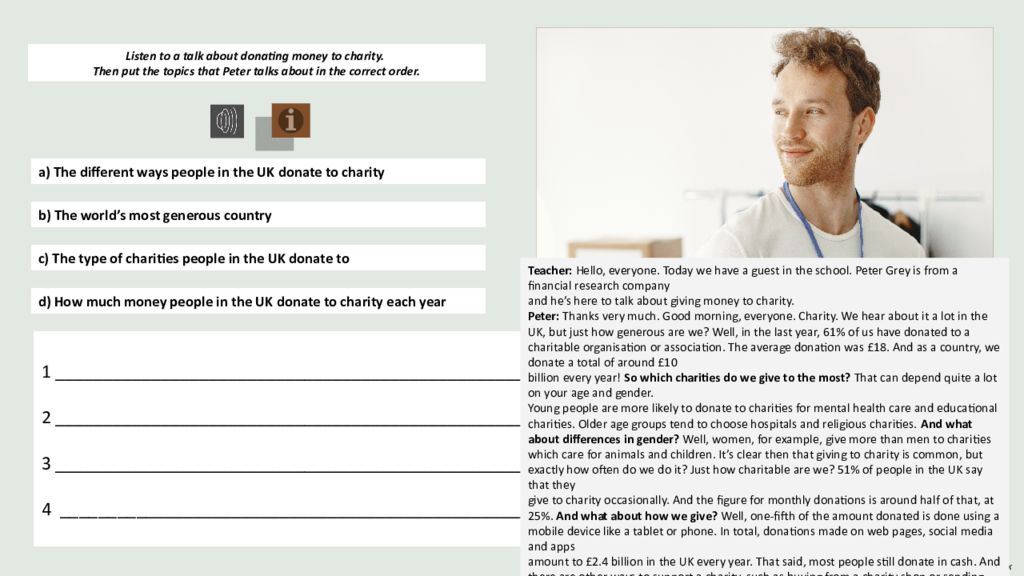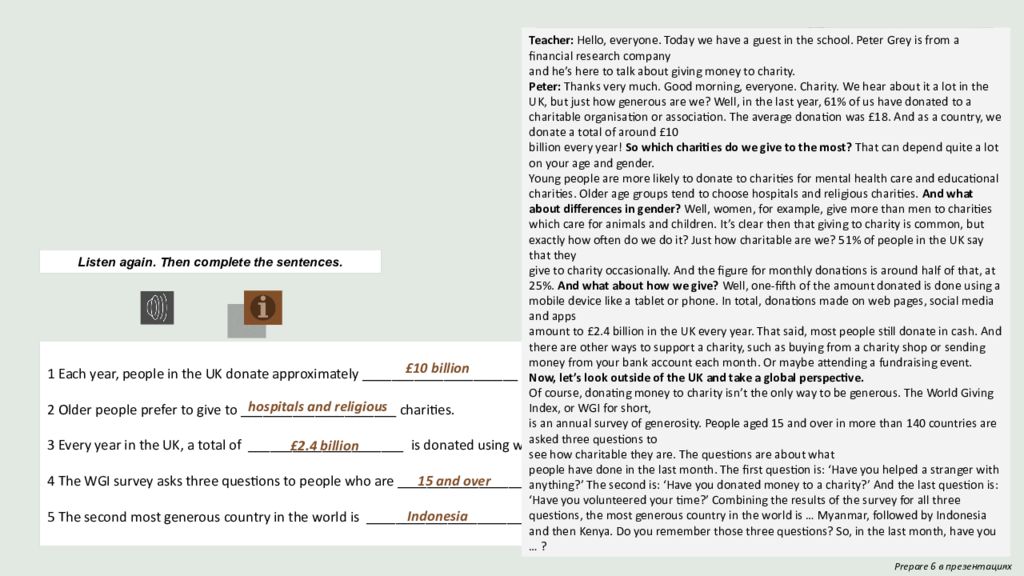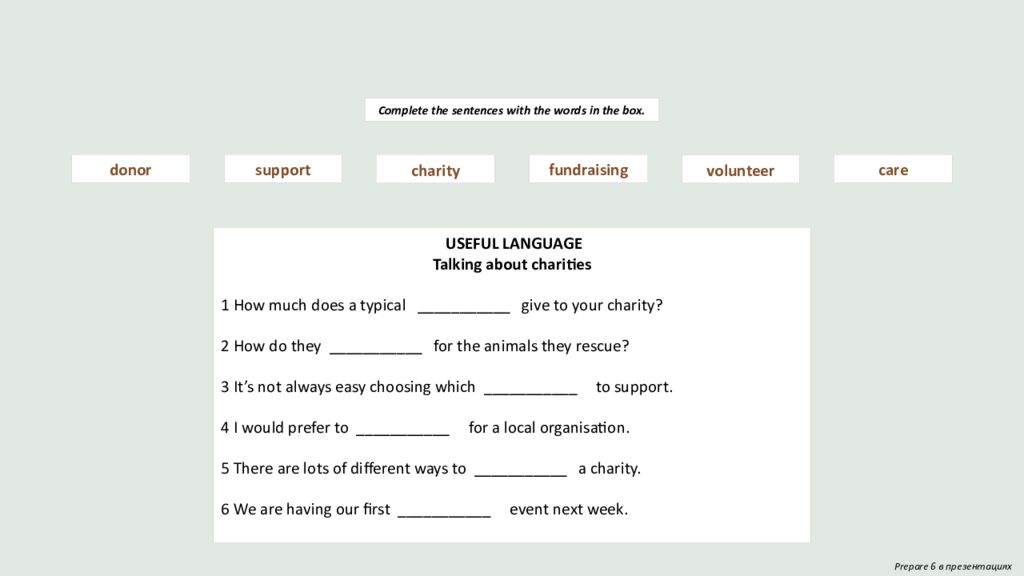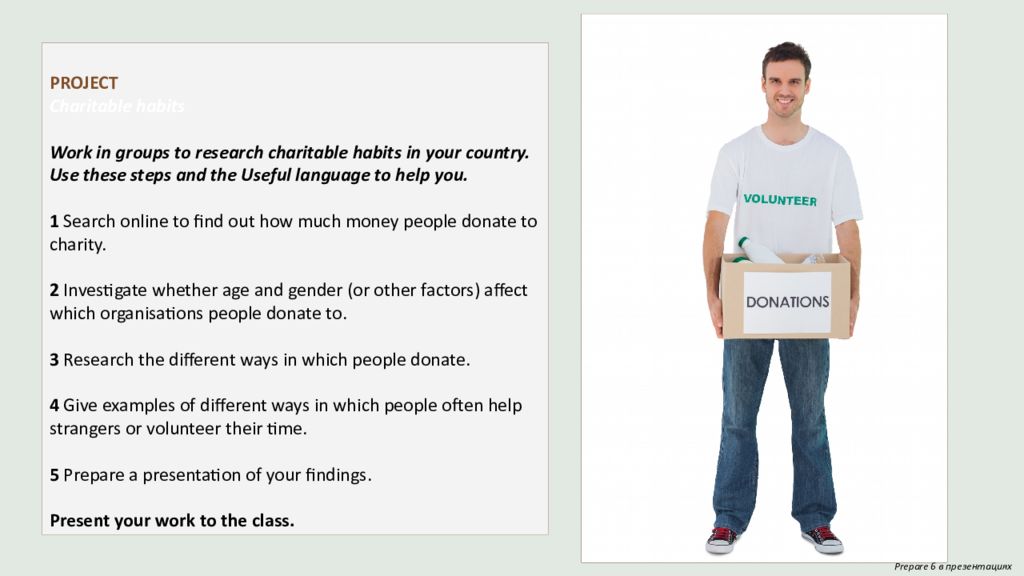Слайд 2
Prepare 6 в презентациях Are you more of a spender or a saver ? Why ? Do you have any traditions in your family ( or country ) related to money ?
Слайд 3
Prepare 6 в презентациях MONEY MATTERS Whether it’s spending, saving, borrowing or lending, culture has a big influence on how we use and think about money. __________________________________________ While people from many countries are quite secretive about how much they earn and their money habits, others are not so private. For example, the Chinese will often tell people how much they earn or how much their house cost. And it’s normal for them to talk to close friends about their savings and spending habits. On the other hand, the British will also talk about their spending habits, but they rarely discuss their earnings or savings with anyone. __________________________________________ Despite the availability of contactless cards and payment with mobile phone apps, there are cultures which still believe that cash is best. Germans pay for around 80% of their purchases in cash. They believe that a physical connection with money helps them be more aware of how much they are spending. Which country uses the least cash? Well, the UK is the third most ‘cashless’ country. 52% of transactions are made by non-cash payment methods. But the UK is still behind Sweden, at 59%, and Canada, at 57%, the two most cashless nations. 3. __________________________________________ On average, Chinese people save around 37% of their income. That’s a huge amount when we compare it to the average household in Spain, who save only 1.75% of their income. Other countries somewhere between these two are Mexico, with savings of 15%, and Russia, with nearly 8%. 4. __________________________________________ Most people make sure that they cut the price tag off a gift. But in China, for some gifts such as gold jewellery, it’s common to leave the price on the gift so the receiver can see how generous you are. How would you feel about getting a gift and knowing exactly how much someone has spent? 5. __________________________________________ People in south-western India have an interesting solution for when they need money for something big like building a house. They have a party and guests are expected to make a cash donation to help raise money. However, it’s not as simple as just having a party. The guest will probably return the invitation later on. And the person who organised the first party is expected to pay a larger amount than what they originally received as a donation. 6. __________________________________________ Weddings can be very expensive occasions. Guests at a Greek wedding take turns to pin banknotes onto the bride and groom’s clothes … while they dance! It sounds like it could be a little painful at times! The money is to help the married couple begin their new life together. 7. __________________________________________ The idea of wealth can be a cultural matter. For example, some Native American cultures have a ‘gift economy’. Instead of paying people money for something, people give things to each other. And there is no agreement that they will receive anything in return in the future. In these cultures, wealth is not just about getting and having money. It is connected to how things are distributed and shared. These things can be money, but also the time or knowledge needed to help someone. 8. __________________________________________ Parents in some countries give their kids an allowance for helping around the house and doing chores like loading the dishwasher. On average, a 15-year-old in Europe gets 20 euros a week. In the UK, it’s also common for many teenagers to do paid jobs at the weekend, such as washing cars or dog walking. For many young people, this is their first financial responsibility and it teaches them how to save and make good financial choices. Read the web page quickly. Then match the headings to the sections. A Who shall we invite? B Cash or card? C Only one way to be ‘rich’? D Would you like to know how much I earn? E I spent £200 on your present! F Learning the real value of money G Saving for a rainy day H Ouch! Be careful, please!
Слайд 4
Prepare 6 в презентациях MONEY MATTERS Whether it’s spending, saving, borrowing or lending, culture has a big influence on how we use and think about money. Would you like to know how much I earn? While people from many countries are quite secretive about how much they earn and their money habits, others are not so private. For example, the Chinese will often tell people how much they earn or how much their house cost. And it’s normal for them to talk to close friends about their savings and spending habits. On the other hand, the British will also talk about their spending habits, but they rarely discuss their earnings or savings with anyone. Cash or card? Despite the availability of contactless cards and payment with mobile phone apps, there are cultures which still believe that cash is best. Germans pay for around 80% of their purchases in cash. They believe that a physical connection with money helps them be more aware of how much they are spending. Which country uses the least cash? Well, the UK is the third most ‘cashless’ country. 52% of transactions are made by non-cash payment methods. But the UK is still behind Sweden, at 59%, and Canada, at 57%, the two most cashless nations. 3. Saving for a rainy day On average, Chinese people save around 37% of their income. That’s a huge amount when we compare it to the average household in Spain, who save only 1.75% of their income. Other countries somewhere between these two are Mexico, with savings of 15%, and Russia, with nearly 8%. 4. I spent £200 on your present! Most people make sure that they cut the price tag off a gift. But in China, for some gifts such as gold jewellery, it’s common to leave the price on the gift so the receiver can see how generous you are. How would you feel about getting a gift and knowing exactly how much someone has spent? Read the web page again. Then answer the questions. 1 What are Chinese people happy to talk about with people who they know well ? 2 Who prefers paying for things in cash and why ? 3 Who saves the most money ? 4 Why would someone in China give you a present with the price still on it ?
Слайд 5
Prepare 6 в презентациях 5. Who shall we invite? People in south-western India have an interesting solution for when they need money for something big like building a house. They have a party and guests are expected to make a cash donation to help raise money. However, it’s not as simple as just having a party. The guest will probably return the invitation later on. And the person who organised the first party is expected to pay a larger amount than what they originally received as a donation. 6. Ouch! Be careful, please! Weddings can be very expensive occasions. Guests at a Greek wedding take turns to pin banknotes onto the bride and groom’s clothes … while they dance! It sounds like it could be a little painful at times! The money is to help the married couple begin their new life together. 7. Only one way to be ‘rich’? The idea of wealth can be a cultural matter. For example, some Native American cultures have a ‘gift economy’. Instead of paying people money for something, people give things to each other. And there is no agreement that they will receive anything in return in the future. In these cultures, wealth is not just about getting and having money. It is connected to how things are distributed and shared. These things can be money, but also the time or knowledge needed to help someone. Learning the real value of money Parents in some countries give their kids an allowance for helping around the house and doing chores like loading the dishwasher. On average, a 15-year-old in Europe gets 20 euros a week. In the UK, it’s also common for many teenagers to do paid jobs at the weekend, such as washing cars or dog walking. For many young people, this is their first financial responsibility and it teaches them how to save and make good financial choices. Read the web page again. Then answer the questions. 5 What might happen in south-western India if you accept a return invitation to a party ? 6 When should the couple getting married at a Greek wedding be careful ? 7 Apart from money, how else does Native American culture view wealth ? 8 What are the benefits of having an allowance ?
Слайд 6
Prepare 6 в презентациях a) Despite the availability of contactless cards and payment with mobile phone apps, there are cultures which still believe that cash is best. Germans pay for around 80% of their purchases in cash. They believe that a physical connection with money helps them be more aware of how much they are spending. b) 52% of transactions are made by non-cash payment methods. c) Most people make sure that they cut the price tag off a gift. d) And the person who organised the first party is expected to pay a larger amount than what they originally received as a donation. e) The idea of wealth can be a cultural matter. Match the highlighted words in the text to their meanings. 1 a large amount of money or valuable possessions _________________ 2 a small piece of paper with information on _________________ 3 using wireless technology to pay _________________ 4 money given to help a person or organization _________________ 5 ways of paying money _________________ wealth tag contactless payment methods donation
Слайд 7
Prepare 6 в презентациях Which of the money facts or habits do you find most surprising ? Why? If you were looking for a weekend job to make some money for yourself, what would you like to do?
Слайд 8
Prepare 6 в презентациях Prepare 6 в презентациях Listen to a talk about donating money to charity. Then put the topics that Peter talks about in the correct order. 1 ____________________________________________________________ 2 ____________________________________________________________ 3 ____________________________________________________________ 4 ____________________________________________________________ a) The different ways people in the UK donate to charity b) The world’s most generous country c) The type of charities people in the UK donate to d) How much money people in the UK donate to charity each year Teacher: Hello, everyone. Today we have a guest in the school. Peter Grey is from a financial research company and he’s here to talk about giving money to charity. Peter: Thanks very much. Good morning, everyone. Charity. We hear about it a lot in the UK, but just how generous are we? Well, in the last year, 61% of us have donated to a charitable organisation or association. The average donation was £18. And as a country, we donate a total of around £10 billion every year! So which charities do we give to the most? That can depend quite a lot on your age and gender. Young people are more likely to donate to charities for mental health care and educational charities. Older age groups tend to choose hospitals and religious charities. And what about differences in gender? Well, women, for example, give more than men to charities which care for animals and children. It’s clear then that giving to charity is common, but exactly how often do we do it? Just how charitable are we? 51% of people in the UK say that they give to charity occasionally. And the figure for monthly donations is around half of that, at 25%. And what about how we give? Well, one-fifth of the amount donated is done using a mobile device like a tablet or phone. In total, donations made on web pages, social media and apps amount to £2.4 billion in the UK every year. That said, most people still donate in cash. And there are other ways to support a charity, such as buying from a charity shop or sending money from your bank account each month. Or maybe attending a fundraising event. Now, let’s look outside of the UK and take a global perspective. Of course, donating money to charity isn’t the only way to be generous. The World Giving Index, or WGI for short, is an annual survey of generosity. People aged 15 and over in more than 140 countries are asked three questions to see how charitable they are. The questions are about what people have done in the last month. The first question is: ‘Have you helped a stranger with anything?’ The second is: ‘Have you donated money to a charity?’ And the last question is: ‘Have you volunteered your time?’ Combining the results of the survey for all three questions, the most generous country in the world is … Myanmar, followed by Indonesia and then Kenya. Do you remember those three questions? So, in the last month, have you … ?
Слайд 9
Prepare 6 в презентациях Listen again. Then complete the sentences. 1 Each year, people in the UK donate approximately _____________________. 2 Older people prefer to give to _____________________ charities. 3 Every year in the UK, a total of _____________________ is donated using web pages, social media and apps. 4 The WGI survey asks three questions to people who are _____________________. 5 The second most generous country in the world is _____________________. hospitals and religious £10 billion £2.4 billion 15 and over Indonesia Teacher: Hello, everyone. Today we have a guest in the school. Peter Grey is from a financial research company and he’s here to talk about giving money to charity. Peter: Thanks very much. Good morning, everyone. Charity. We hear about it a lot in the UK, but just how generous are we? Well, in the last year, 61% of us have donated to a charitable organisation or association. The average donation was £18. And as a country, we donate a total of around £10 billion every year! So which charities do we give to the most? That can depend quite a lot on your age and gender. Young people are more likely to donate to charities for mental health care and educational charities. Older age groups tend to choose hospitals and religious charities. And what about differences in gender? Well, women, for example, give more than men to charities which care for animals and children. It’s clear then that giving to charity is common, but exactly how often do we do it? Just how charitable are we? 51% of people in the UK say that they give to charity occasionally. And the figure for monthly donations is around half of that, at 25%. And what about how we give? Well, one-fifth of the amount donated is done using a mobile device like a tablet or phone. In total, donations made on web pages, social media and apps amount to £2.4 billion in the UK every year. That said, most people still donate in cash. And there are other ways to support a charity, such as buying from a charity shop or sending money from your bank account each month. Or maybe attending a fundraising event. Now, let’s look outside of the UK and take a global perspective. Of course, donating money to charity isn’t the only way to be generous. The World Giving Index, or WGI for short, is an annual survey of generosity. People aged 15 and over in more than 140 countries are asked three questions to see how charitable they are. The questions are about what people have done in the last month. The first question is: ‘Have you helped a stranger with anything?’ The second is: ‘Have you donated money to a charity?’ And the last question is: ‘Have you volunteered your time?’ Combining the results of the survey for all three questions, the most generous country in the world is … Myanmar, followed by Indonesia and then Kenya. Do you remember those three questions? So, in the last month, have you … ?
Слайд 10
Prepare 6 в презентациях Complete the sentences with the words in the box. USEFUL LANGUAGE Talking about charities 1 How much does a typical ___________ give to your charity? 2 How do they ___________ for the animals they rescue? 3 It’s not always easy choosing which ___________ to support. 4 I would prefer to ___________ for a local organisation. 5 There are lots of different ways to ___________ a charity. 6 We are having our first ___________ event next week. donor care fundraising volunteer support charity
Последний слайд презентации: Prepare 6 в презентациях Culture ATTITUDES TO MONEY
Prepare 6 в презентациях PROJECT Charitable habits Work in groups to research charitable habits in your country. Use these steps and the Useful language to help you. 1 Search online to find out how much money people donate to charity. 2 Investigate whether age and gender ( or other factors ) affect which organisations people donate to. 3 Research the different ways in which people donate. 4 Give examples of different ways in which people often help strangers or volunteer their time. 5 Prepare a presentation of your findings. Present your work to the class.

